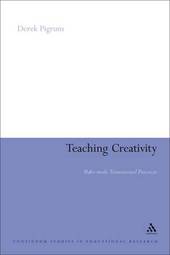
|
Teaching Creativity: Multi-mode Transitional Practices
Paperback / softback
Main Details
| Title |
Teaching Creativity: Multi-mode Transitional Practices
|
| Authors and Contributors |
By (author) Dr Derek Pigrum
|
|
Series edited by Anthony Haynes
|
| Series | Continuum Studies in Educational Research |
|---|
| Physical Properties |
| Format:Paperback / softback | | Pages:216 | | Dimensions(mm): Height 234,Width 156 |
|
| ISBN/Barcode |
9781441117892
|
| Classifications | Dewey:370.118 |
|---|
| Audience | | Professional & Vocational | |
|---|
| Edition |
NIPPOD
|
| Illustrations |
30
|
|
Publishing Details |
| Publisher |
Continuum Publishing Corporation
|
| Imprint |
Continuum Publishing Corporation
|
| Publication Date |
5 January 2012 |
| Publication Country |
United States
|
Description
This study is concerned with creativity in education - especially in arts education (broadly conceived to include the visual arts, music, and creative writing). It takes as its starting point Nietzsche's view that works of art do not appear "as if by magic". Using insights from philosophy, psychoanalysis, and semiotics, the book examines the creative processes of many artists in different media, showing how art works often result from processes of construction, deconstruction, and reconstruction that may be long and laborious. Pigrum demonstrates how teachers and their students in all sectors of education may gain from a better, systematic, understanding of such processes.
Author Biography
Derek Pigrum is Visiting Research Fellow in the Department of Education at the University of Bath, UK. He is an active member of the Philosophy of Education Society of Great Britain.
Reviews'The book is a profound work of research in which Pigrum systematically leads the reader through the covert and overt stages of the creative process, looking deep into its philosophical, psychological, cultural, and circumstantial aspects. [...] Teaching Creativity is a scholarly, reflective book that is rich, intense, condensed, and at the same time seems to be written with a remarkably free hand and spirit.' - Studies in Gestalt Therapy, 2009
|